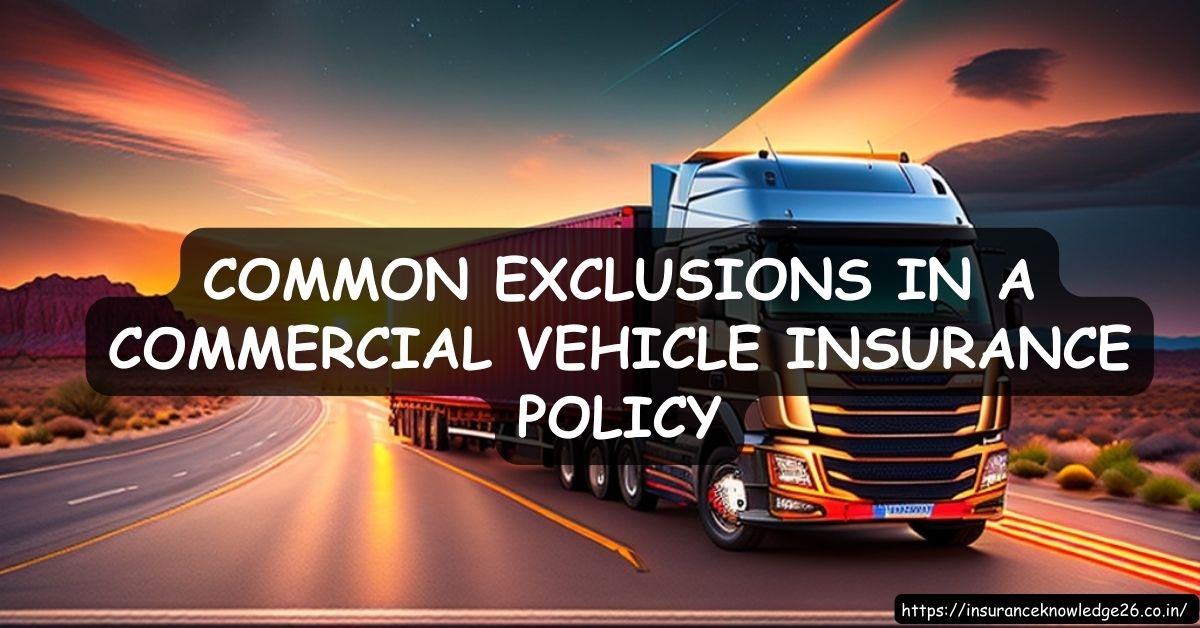A commercial vehicle insurance policy is a vital safeguard for businesses that rely on vehicles to carry out their operations. It provides protection against various risks and liabilities associated with commercial vehicles, ensuring financial security and peace of mind. However, it’s crucial for business owners to be aware that not all risks are covered under a standard commercial vehicle insurance policy. There are specific exclusions that policyholders need to understand to avoid potential gaps in coverage. In this article, we will explore the common exclusions in a commercial vehicle insurance policy, shedding light on what is not covered and how businesses can address these gaps.

1. Intentional Acts
A significant exclusion in most insurance policies, including commercial vehicle insurance, is coverage for intentional acts. If a driver intentionally causes damage to the insured vehicle or is involved in an intentional act leading to an accident, the insurance policy will not provide coverage for the resulting damages or liabilities.
2. Personal Use of Commercial Vehicles
Commercial vehicle insurance is designed to cover vehicles used for business purposes. If a vehicle insured under a commercial policy is used for personal use, any accidents or incidents occurring during such use may not be covered. It’s essential for businesses to ensure that employees refrain from using company vehicles for personal errands to avoid potential coverage gaps.
3. Employee Fraud or Dishonesty
Incidents involving fraudulent activities or dishonest acts by employees may not be covered under a commercial vehicle insurance policy. For example, if an employee intentionally causes an accident to make a false claim, the insurer may deny coverage for the claim.
4. Racing and Speed Contests
Commercial vehicle insurance policies typically exclude coverage for accidents occurring while the insured vehicle is participating in racing events or speed contests. Such activities are considered high-risk and fall outside the scope of standard insurance coverage.
5. Hauling Hazardous Materials
Certain commercial vehicle insurance policies exclude coverage for vehicles involved in hauling hazardous materials. Businesses that require transportation of such substances must obtain specialized insurance coverage to address this exclusion adequately.

6. Non-Owned Vehicles
A standard commercial vehicle insurance policy may not cover vehicles that the business uses but does not own. For example, if the business rents a vehicle for a short-term project, it may not be covered under the regular policy. Non-owned vehicle coverage can be added as an endorsement to address this exclusion.
7. Wear and Tear
Commercial vehicle insurance typically does not cover damages resulting from regular wear and tear, mechanical breakdowns, or maintenance issues. These are considered the responsibility of the vehicle owner to address through routine maintenance.
8. War and Acts of Terrorism
Most commercial vehicle insurance policies exclude coverage for damages or losses resulting from war, acts of terrorism, or civil unrest. Businesses operating in areas with higher risks of such events may need to explore specialized insurance solutions.
9. Trailer Coverage
The coverage for trailers attached to commercial vehicles may have limitations or exclusions in standard policies. Business owners must verify whether their policy covers trailers or if additional coverage is required.
10. Unauthorized Use or Drivers
If a commercial vehicle is driven by someone who is not authorized by the policyholder or outside the scope of permitted drivers, the insurance policy may not cover any resulting accidents or incidents.

Addressing Coverage Gaps
While understanding exclusions is crucial, businesses can take proactive steps to address potential coverage gaps in their commercial vehicle insurance policy:
1. Customized Policies: Work with an experienced insurance agent to tailor the policy to the specific needs of the business, ensuring adequate coverage for the risks unique to the operations.
2. Endorsements: Consider adding endorsements or riders to the policy to extend coverage for specific exclusions. For example, adding a non-owned vehicle endorsement can provide coverage for rented or borrowed vehicles.
3. Specialized Coverage: For businesses involved in activities with high-risk exclusions, explore specialized insurance options that cater to those specific risks.
4. Regular Review: Periodically review the insurance policy with the insurance agent to ensure it aligns with the business’s evolving needs and any changes in operations.
Understanding the common exclusions in a commercial vehicle insurance policy is essential for businesses to be fully aware of their coverage limitations. By knowing what is not covered, businesses can take proactive steps to address potential gaps in insurance protection. Working closely with experienced insurance agents, customizing policies, adding endorsements, and exploring specialized coverage options can help ensure that a commercial vehicle insurance policy provides comprehensive protection and peace of mind for businesses relying on their fleet to drive success.
Disclaimer
The information provided in this post is based on general knowledge and may not be up-to-date or applicable to specific insurance products or regulations in your jurisdiction. Insurance policies and regulations can vary widely, so it’s essential to research and verify information with local authorities or insurance providers.

